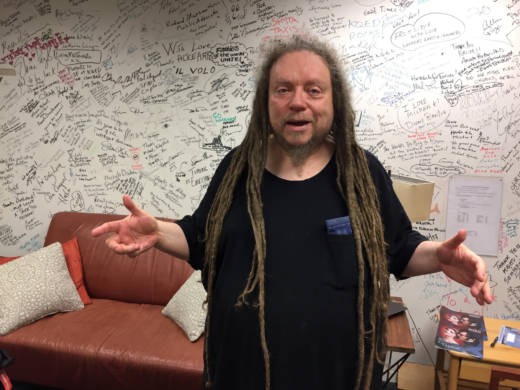It’s not hard like a text book. It’s hard like a fantasy novel. Like if you’re into “Infinite Jest” or a Pynchon book, you might like it. It’s a little closer to that sort of book perhaps. [12.4]
Why should we still be reading about virtual reality?
Virtual reality is in some ways the ultimate digital technology. It pushes it as far as it can go to synthesize reality. So if you understand virtual reality, you can then understand other kinds of digital technology more easily. Virtual reality is potentially both the creepiest and the most beautiful form of digital technology. I think it’s easily the most fun form of digital technology. I certainly have had more fun with it than anything else.
I don’t think you can create a wonderful world without creating a beautiful world. And if the world is going to be partially digital, we have to find digital beauty, and virtual reality is probably the most beautiful thing we can do with computers. So for all of those reasons I think you need to understand it.
What’s the coolest thing you’ve experienced in virtual reality?
The most interesting thing to do in virtual reality is to change your own body. It turns out rather by surprise that you can turn into different creatures or all kinds of things in virtual reality. You can learn to occupy a body that’s very different from the mammalian plan, and you can still operate it. And when you change your body, you change the way you perceive the world in really interesting ways. You can also have social experiences in virtual reality that are rather radical and interesting like sharing bodies with other people.
What’s the creepiest thing you’ve experienced in virtual reality?
A colleague of mine named Jeremy Bailenson at Stanford can play with your avatar and make you more or less racist and you don’t even realize it’s happened. He can change the outcome of a negotiation or who you vote for in a simulation and all kinds of things like that. So it’s potentially very creepy, and you might say well shouldn’t we outlaw it?
What I think the solution is for people to become literate in things like this so they can tell that they’re being manipulated, so they understand it. I think what we need is a new form of informed populace right now. The way to enjoy the technology is not to trust it. And there’s no contradiction in that. We have to learn to be skeptical technology users, and that’ll make good technology users and that’ll effectively make the technology better. So I want people to become literate in things like for virtual reality so they aren’t fooled by it.
What do you like to do on the weekends?
I have an 11-year-old-daughter which is the best thing in the world. So I love doing things with her. And like I’m probably three seconds away from her being less interested in that. I love just grabbing whatever moments I have. I love playing music. I love playing music with friends around the Bay Area.
What are your favorite music venues?
I like little places. To me there’s something about playing in a small venue to a small audience that’s almost sacred. I’m not trying to be a musical star at all. I just love this sort of magic that happens when a little musical event works. I also just think the people who are willing to devote themselves to making these venues work are like saints. In Berkeley where I live we have The Back Room, Freight & Salvage, Ashkenaz and many others. We have these amazing smaller venues and they are so precious. The Internet killed a lot of our bookstores and other things, but so far the venues are somehow surviving, and I hope they’ll continue to.
How does your love of music influence your work in virtual reality?
For me, musical instruments are not only the best user interfaces that have ever existed, they might be the only good ones that have ever existed for controlling a complicated system. So I just can’t imagine being interested in the future of computation without being fascinated with musical instruments.
What’s the most inspirational piece of music for you?
